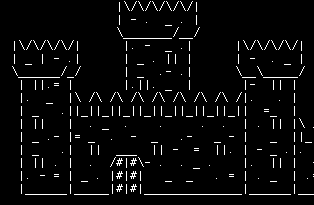Slowly, slowly, I am emerging from the sessile phase that I entered after surviving (and passing, praise Eris!) my doctoral qualifying exams. I am anticipating a full return to something approaching full motility and sentience.
After such extended periods of ascetically-focused mental exertion, I find myself enveloped in a sort of lassitudinous passivity. All of the needs that have been denied demand to be satisfied, and I descend into a gluttonous pit of media consumption.
Over the past few weeks, I’ve read a dozen books or so (not, I am sorry to say, of a particularly elevating nature), watched way too many back episodes of science fiction television shows, and finally got around to finishing several video games that had been sitting, unplayed on the shelf. Work, school, and Latin studies continue apace, but my free time has been heavily unstructured. Here are a few comments on what’s been occupying my mind. I warn you, though: if you’re looking for high-brow in this post, you’d best move along.
Books
From the books, I can definitely recommend Charles Stross’s The Atrocity Archives . . . it’s not often that one finds a novel where the central conceit is the existence of a proof that P=NP, and his melding of the myth of Medusa with quantum mechanical theory is a thing of genius. The Family Trade, also by Stross, is a bit disappointing by comparison, as the characters and writing are a bit flat and the fancies do not fly as high.
Neal Asher had previously caught my attention with The Skinner, which was a great science fiction romp. (One of its best small bits is a unique take on technologically-sustained undeath.) I was pleased to get my hands on a copy of Prador Moon, but it left me unimpressed. The plot was on the mechanical side, and the tension wasn’t particularly tense. I also have a copy of Brass Man which I may or may not finish before returning it to the library; thus far, it hasn’t drawn me in.
Lois McMaster Bujold’s Beguilement: The Sharing Knife is her second run at a romance-oriented fantasy, and it strongly echoes The Hallowed Hunt. The plot structure is somewhat curious, with the ostensible dramatic climax coming in the first third of the book. The remainder focuses on the relationship between the characters. I have to say that it didn’t really work for me, though her writing is competent, and I enjoyed the story well enough. I’ll be curious to see what she does with the next two novels in the trilogy. The Hallowed Hunt is, in my opinion, a much stronger novel, if not quite up to her previous Chalion efforts.
I’ve been meaning to bone up on the history of sword-and-sorcery fantasy, and nabbed a few volumes from the library to that end. Robert E. Howard’s early Kull of Atlantis stories are purple and overwrought, with some curious parallels to Lovecraft (who, it should noted, admired Howard’s writing). I’ve never read any of his Conan stories, and it will be interesting to compare.
Also in this vein, I read the first three collections of Fritz Leiber’s Lankhmar stories: Swords and Deviltry, Swords Against Death, and Swords in the Mist. It is interesting to see how Leiber’s tropes have worked their way throughout the genre, but I really can’t recommend them as particularly good. The origin stories in Swords and Deviltry were particularly weak, barely rising above the level of Gygaxian fiction.
To recover from too much low-grade fiction, I reread Michael Swanwick’s Stations of the Tide. What a difference! Swanwick remains one of my favorite SF authors, and I hope that he’ll get around to releasing that new novel one of these days (his last was the 2002 Bones of the Earth).
I’ve followed Terry Pratchett’s Discworld novels since I first found The Colour of Magic in 1989. Over the years, his books have become something more than simple humorous parody. His combination of mood, character, and humor is quite effective, and his Vimes stories are among my favorite modern fantasies. Recently, he has written a few Discworld novels targeting the “young adult” market. The Wee Free Men, A Hat Full of Sky, and Wintersmith tell the story of a young witch, Tiffany Aching and her interactions with the Nac Mac Feegle (a race of small, blue-tattooed faerie-kin called, well, Pictsies). There are few characters from other Discworld stories: I only noticed Granny Weatherwax and Nanny Ogg. These books are by no means inferior efforts, and should be read by everyone who likes Pratchett’s work.
Television
It’s been quite a while since I’ve seen Star Trek (Enterprise didn’t hold my attention at all). I’ve just watched my way through the sixth season of Next Generation, which was quite a reasonable show. The late seasons were much better than the painfully wooden early episodes, but they’re still rather mechanical, particularly when watched in close succession. I did have have to skip two episodes for excessive obnoxiousness.
I’ve just started watching Firefly, which thus far has been quite engaging. I’ll reserve further comments until I’m all the way through.
Video Games
First, Archangel. This is a modern magic-themed first-person combat game with some sort of a story, but I couldn’t bear to keep playing past the training sequence. The vocal acting is mind-shatteringly awful.
I hadn’t played a lot of racing games before this, but I have three that were picked up on deep discount: Midnight Club 2, Need for Speed: Underground, and Need for Speed Underground 2. All are reasonably satisfying arcade-style racers, but I think that NFSU2 gets the nod.
NFSU is fun up until around 80% completion. At that point the races become joyless exercises in perfectionism, even at the lowest difficulty setting. I abandoned play at that point.
MC2 becomes quite difficult by the end, but is quite beatable. Its key advantages over the NFS titles are: lots of shortcuts to discover, no mind-numbing closed-course races, and a semblance of damage model for the vehicles. Watching the NFS vehicles bouncing hood-over-trunk then blithely driving on is just silly (though none of these titles get many points in the realism department).
NFSU2 loses some features that were well-polished NFSU, but makes up for them by adding an explorable world. The visuals are superb, and the gameplay is rather easier than that of its predecessor. I would have like to see a few more free-form races, but modifying and tuning the cars is surprisingly enjoyable. The game would be improved by abandoning the silly graphic novel sequences that spring up occasionally. I’m perhaps halfway though this game, but it will be going back on the shelf for a while.
I now return to my regularly-scheduled life.


 I am agog.
I am agog.
